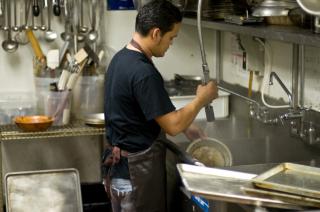On a Dishwasher’s Wage

His name was John. He was a Nigerian immigrant about my parents’ age. I was a suburban 18-year-old, living in Boston with college friends the summer after my freshman year. John and I rode the MBTA together after our shifts as dishwashers in a fancy Harvard Square restaurant.
I don’t know how long John had been working there. I had seen a “Dishwasher Wanted” sign and wandered in one day in June, having decided on a whim to stay in Boston for the summer. My parents had said it was okay, as long as I found a safe place to live, got a job to help pay for it, and returned to college in the fall. The restaurant manager was skeptical about my gender (female), my size (small), and my age. He seemed amused to hire me for the minimum wage position.
I was subletting a room for $20 a week in a nice, safe neighborhood. I don’t know where John lived; his ride home continued after my stop. I know a little about his expenses, though. He supported himself in the U.S. and sent home money to support his wife, his children, and some unemployed relatives in Lagos. He hoped to begin saving for his family to come join him.
The dishwashing job was decent and kitchen staff turnover was high. After a few weeks I was promoted, with a raise, to lunch prep cook. I had no qualifications. Maybe I was a really lousy dishwasher. I learned to make the restaurant’s signature mousse cake and recreated it for my friends.
I was gone by the end of August. John was not promoted to the lunch prep job. I don’t know what happened to him. I can’t imagine how he ever could have afforded to bring his family to the U.S. The head chef of that restaurant went on to open several “foodie” restaurants in the Boston area. By the time I finished college, the sous chef had a network tv cooking show. I once saw her interview Julia Child.
In the restaurant business, a few get rich but the poor usually stay poor. The more successful a restaurant, the more low-skill, low-wage jobs it generates. And the people doing these jobs are routinely passed over for training and promotion opportunities.
The Unitarian Universalist Association’s 2013-14 Common Read offers a hard look at the food service industry and inspiration for how you can help make its labor practices more just. Behind the Kitchen Door by Saru Jayaraman (ILR Press, 2013) reveals the realities of restaurant jobs through the stories of the low-wage workers who do them. Where discrimination and oppression can take root, economic injustice can grow. Jayaraman suggests that labor practices should be a factor in the “sustainability” to which many of us have begun to aspire in all our human transactions.
Diners, workers, readers, and activists! Take note!
Next Steps!
Gather some readers and dig into Behind the Kitchen Door. The UUA Bookstore offers a discount of 10% on a purchase of 5-9 copies, and a discount of 20% on 10 copies or more. The discount is applied automatically to online orders.
On the UUA website learn more about the UUA Common Read: why and how you might start a group, and information about the current and previous years’ book selections.
The UUA provides a Common Read discussion guide for Behind the Kitchen Door online (PDF format), at no charge.